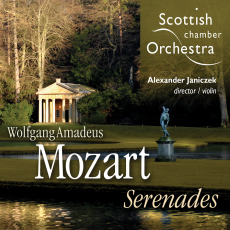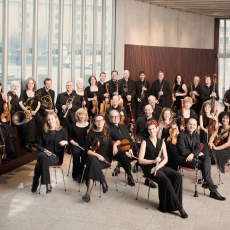Mozart Serenades - SCO - Audiophile Audition
Alexander Janiczek here has created a recording that recalls Peter Maag's early Mozart programs for Decca. The repertoire, even for Mozart, is both unhackneyed and delightfully sequenced and varied; the performances are alert, full-blooded and irresistibly engaging; and the sound is brilliant, whether in conventional stereo or SACD.
The most surprising of the pieces on this generously-filled new release is the big D Major, so-called "Andretter" Serenade in seven movements. According to the program notes, most of these serenades, and there were six altogether, "were designed to accompany the end-of-year celebrations at the University; on an evening in early August the serenade would be played twice, first at the Archbishop's summer residence, and then in the Kollegienplatz (now the Universitätsplatz) to an audience of students and professors." For those familiar with the better known Serenades, like the Posthorn and Haffner, this will be a pleasant reminder that the invention here is just as rich and relentless. For everyone, it will be a reflection on what life was once like for a privileged few.
Janiczek chooses a wonderful, and wonderfully obscure little March to introduce the Serenade, continues on with a quasi Violin Concerto in the form of three separate solo movements, and winds things up with another rarely-recorded orchestral work, the Divertimento in E flat, that is both relatively short and very sweet.
The recording was made at Greyfriars Kirk in Edinburgh last June, produced by Philip Hobbs and engineered by Calum Malcolm. It is razor-sharp and extremely colorful in stereo, it gains significant spatial bloom and inner detail in its Super Audio mode. The recording also highlights the conductor's desire for the winds to add color without being overly spotlighted (another approach, equally valid and a little more "punky," can be heard in the recent Berlin Classics reissue of Mozart from conductor Ludwig Güttler and the Virtuosi Saxoniae)
In both versions it adds to Linn's increasing reputation as an industry-leading standard setter. Not to mention that in the Salzburg-born Janiczek (who is of Polish and Czech descent), Linn has provided a major introduction for an outstanding young conductor and soloist. And in continuing to record the Scottish Chamber Orchestra, of course, Linn is making it clear that the Edinburgh-based ensemble has few peers. Duncan Druce's outstanding program notes are in the old style, and inimitably so, combining authority with affection and a lovely writing style.

